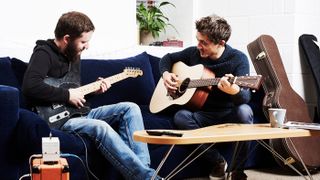Taking the step from bedroom musician to collaborating with others can seem daunting. But it doesn’t need to be, and could the best decision you ever make…
We all love playing music - it’s why we’re here right now - and one of the greatest things about it is it’s a journey you can make on your own; taking it with your wherever you are to steal a few minutes or hours nailing that lick or just seeing what you can come up with.
Reaching out to find other musicians can feel like a huge leap
But playing with others is a whole other level of learning that is worth all players considering regardless of their ambitions. And there’s no substitute for the satisfaction of getting to grips with a song together, or even co-writing one of your own.
But whether you’re arriving in a new city for work or university, or trying to track down people to play with in your hometown, reaching out to find other musicians can feel like a huge leap. Self-doubt rears its head for many; am I good enough? Are there like-minded people out there? What if I don’t want to gig?
Yes, you are, yes there is and it doesn’t matter - there doesn’t need to be an endgame here. Just playing with other musicians in a room can be a great experience, wherever it leads. And we guarantee it will make you a better guitar player, too. So, no more excuses - let’s get out there and see how we can start collaborating…
1. Consider your options
There is no level of ability you need to reach in order to play with other musicians
Firstly, let’s get this out of the way now: there is no level of ability you need to reach in order to play with other musicians.
In fact, the sooner you do it, the better for your playing - learning to play to a drummer’s tempo, the rise and fall of dynamics and setting up your sound with other musicians are all essential skills that will benefit you as a guitarist. The more time you’ve spent practicing with backing tracks or a metronome, the more prepared you’ll be for keeping good time with your playing.
But it’s also important to be clear about what you’re looking for so you can communicate that with others. What kind of musical style do you want to play? What other musicians would you like to find, and are you bothered whether they’re a similar age to you? Covers, originals or a mix? It could just be another guitarist, or you might want to start a band to gig and record.
Start listing the main points for a potential advert but before you go any further have a browse online and your local music shops (some allow musicians to advertise). There may already suitable musicians looking for someone like you.
2. Be clear
Out there are thousands of musicians looking for a variety of people - some need players for function bands to play weddings and the like, others might be looking to form a band that will write their own material and gig.
If you’ve been playing for six months and you want to find people of a similar age, say so
Others might just want to complete a duo or find a writing partner. If you’re placing an advert online to find other musicians or a jamming partner, it’s best to be upfront. If you’ve been playing for six months and you want to find people of a similar age, say so. That way nobody is being mislead.
And we also must add, if you’re going to meet people for the first time, make sure it’s in a public place. As we all know, communicating with people online is one thing, but it’s best to be safe until you know them better.

3. Play online
Technology means you don’t have to meet in person to collaborate with other musicians. If you’ve got a broadband connection and can connect to it via ethernet (you’ll need as consistent speed as possible) you’re halfway there, now you just need to choose what app suits your needs best.
You can join open sessions with people you’ve never met and even record your sessions with some apps (see Internetworking, below). With this kind of possibility in your own home, it’s hard to find an excuse not to play with other musicians.
4. Go public
Perhaps the most nerve-wracking proposition is the open-mic and jam night. Yes there can be the self-appointed hotshot who is there every week to strut their stuff on a Strat but in our experience, these kind of events at your local pub can be really welcoming environments with people who are just trying to learn and have fun with fellow musicians.
You can gain insight from each other; if you see someone play something interesting, ask them to show you
You can gain insight from each other; if you see someone play something interesting, ask them to show you. It can be a great icebreaker. Take an interest and be supportive; it’s too easy for an open mic session to be a case of waiting for your turn. And ‘jam night’ doesn’t have to mean endless solos.
If you want to just sit in on rhythm - do it. And if you don’t know the chords - ask. Nobody ever got laughed at for wanting to learn and being keen to get involved.
5. Stockpile
Preparing to play with other musicians isn’t just about your chops, but your musical ideas, too. Of course, if you’re looking to join up with people for covers then you’ll to start learning a catalogue of other people’s songs, but if you’re writing with people, it’s good to get some ideas together.
They don’t need to be whole songs, in fact the less complete they are the better sometimes. Having some melodic ideas - a riff , chord progression or vocal hook stored for collaboration will get the ball rolling and encourage your musical partners to jump in. Before you know it your little idea might become something much bigger.


